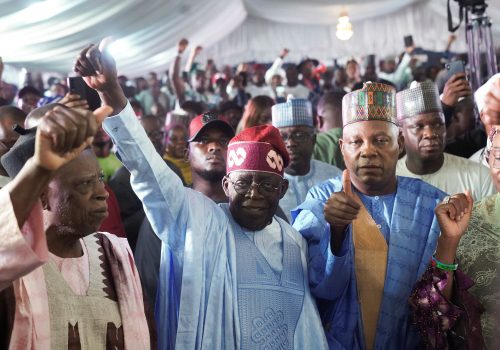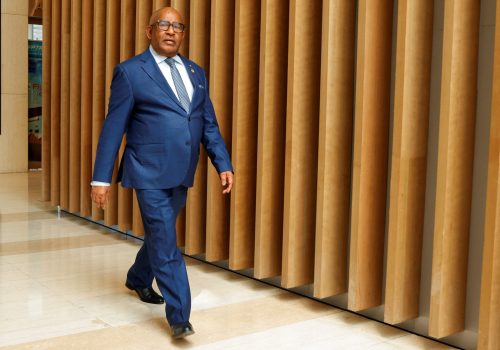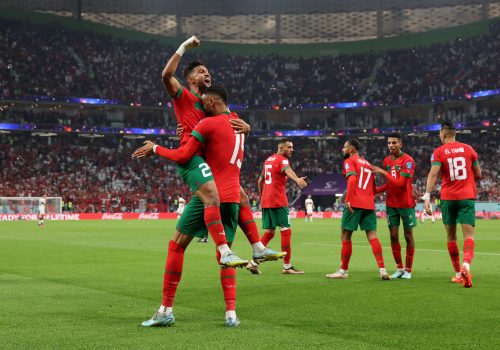What’s in store for Nigeria after a messy election
GET UP TO SPEED
It was a close call. Ruling party candidate Bola Tinubu was declared the narrow winner of Nigeria’s presidential election on Wednesday after balloting delays and scattered violence, with his two closest challengers saying they will dispute the results in court. Assuming Tinubu takes office as planned in May, he will lead a nation that is at once making big strides on the world stage and reeling from crises at home. Why was the election so rocky, and what should the new president’s priorities be? Our experts share their insights.
TODAY’S EXPERT REACTION COURTESY OF
- Constance Berry Newman: Nonresident senior fellow at the Africa Center, former US assistant secretary of state for African affairs, and official international observer of Nigeria’s 2023 elections
- Rama Yade (@ramayade): Senior director of the Africa Center
- Aubrey Hruby (@aubreyhruby): Nonresident senior fellow at the Africa Center and co-founder of Tofino Capital
Notes from the ground
- Constance, who monitored the elections as part of the joint International Republican Institute and the National Democratic Institute Observer Mission, says the government did many things right in administering the election, including technological improvements and getting all political parties to commit to using only peaceful, legal means to challenge the results.
- But she says the government made several key mistakes, including long delays in opening polling sites. “This led to frustrated, often angry, voters, a limited number of whom left and a small number of whom engaged in violent activities,” Constance reports.
- Another failure, she adds, was “a seemingly ineffective and late tabulation announcement process that raised concerns about the announced results.”
- Constance attributes the surprisingly low voter turnout (27 percent) to “a belief that nothing will change anyway, a fear of violence and other intimidation factors, and a lack of an understanding of the voting procedures.”
- But she comes away most impressed with the enthusiastic young people in a country where around 70 percent of the population is younger than age thirty. “Nigeria has reason to hope for a better future because many of the youth are really engaged and understand what is right and wrong for their country.”
Tinubu’s agenda
- While Peter Obi, an outsider candidate from the Labour Party, garnered a ton of international press and led in some polls, Rama tells us that Tinubu’s win is “not a surprise.”
- That’s because Tinubu, 70, hails from the ruling All Progressives Congress party, “is Muslim from the Yoruba-speaking southwest, and even if he lost there, he has strong support in Lagos,” Rama adds.
- But the fact that Tinubu lost Lagos—where he served as governor from 1999 to 2007—“demonstrates the power of the message” from Nigeria’s disaffected youth to their country’s political leaders, Aubrey says. Tinubu spoke directly to their concerns in his victory speech, referring to young people’s “pains, your yearnings for good governance, a functional economy, and a safe nation.”
- It won’t be easy for him to deliver: Aubrey points to Nigeria’s 42.5 percent youth unemployment, rampant inflation, soaring debt burden, and plummeting oil production. Tech and entrepreneurship are “a bright spot” in the economy, but amid a brain drain that’s seeing fifty doctors leave per week to work overseas, she adds, “Tinubu will have to show quick results on the economic front to stem the tide.”
On the world stage
- Tinubu will be immediately thrust into a leadership role on the continent. “The future of the Economic Community of West African States (ECOWAS), the new Eco currency (which has been postponed to 2025), and the African Continental Free Trade Area (which needs to be accelerated) are in Nigeria’s hands,” Rama tells us.
- And as Africa seeks a larger role in the G20 and Bretton Woods Institutions, “Nigeria will play an important role in this unprecedented dialogue,” Rama adds. “The expectations have never been so high.”
Further reading
Wed, Mar 1, 2023
Experts react: As the ruling party’s Tinubu wins a contested election, what’s next for Nigeria?
New Atlanticist By
What went wrong with election administration and what can Bola Tinubu do to win over his critics? Atlantic Council experts, one of whom served on the ground as an election monitor, weigh in.
Thu, Feb 23, 2023
The African Union is at a crossroads. It’s time to seize its moment.
AfricaSource By Rama Yade
The African Union needs to be strong inside to be strong outside. The new chair will need to kick off an exploration of the Union's organization, identity, role, and means.
Wed, Feb 8, 2023
Pan-Africanism and soccer: How Africa can secure its next diplomatic win
AfricaSource By
African nations have an opportunity to collectively lobby for permanent representation in institutions including the UNSC.
Image: Nigerian President Muhammadu Buhari receives Nigeria's newly declared winner of 2023 presidential election, Bola Tinubu in Daura, Nigeria, March 1, 2023. Nigeria's Presidency/Handout via REUTERS THIS IMAGE HAS BEEN SUPPLIED BY A THIRD PARTY. MANDATORY CREDIT


